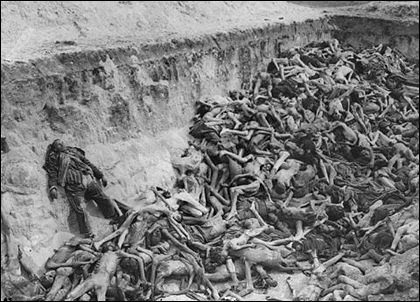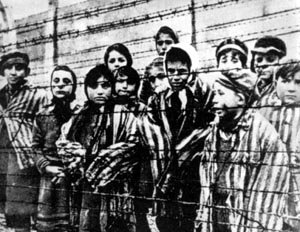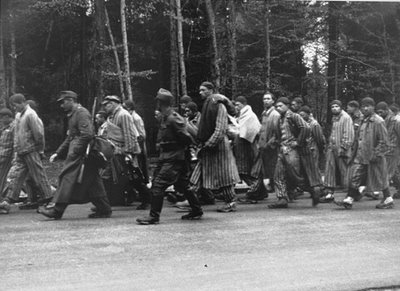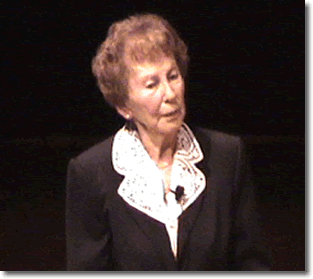remember, remember the Holocaust forever..
Today's school trip is one i will find hard to forget.My history class spent the day at the Holocaust Syposium. No, its not a museum, although it wouldnt have been a bad idea for it to be held at one, instead of at UBC.
But it was certainly an eye-opener. We had 4-5 actual Holocaust survivors speak to a hall of high-school students, while there were other children of survivors and Jewish Proffs of the uni. Its extremely rare to meet a survivor of the Holocaust, much less meet them at the same room.
Simply put, i was moved close to tears so many times by their testimonies.
We've all heard about the Holocaust, and basically understand the weight of it. But its so much more __(fill in the blank)__ when u actually meet a survivor face to face, shack their hand and hear what they had to go thru.

I am recollecting this testimony for my own record and for those who are interested, so please move on if u find this uninteresting:
The first person i met was Peter Parker. No, not spiderman like i initially thought. Originally born Peter Deutsch, he adopted Parker after the war when his mother remarried, conviniently as Deutsch means German in German.
Peter was born and lived in Vienna, Austria till he was 11 yrs old. He lived with his mother and older sister of 18 months, his parents divorced when he was 3. When he was about 8, Nazi Germany over-ran Austria, and he faced much discrimination under the new German laws. So, his mother decided to move him and his sister to nearby Czechoslovakia to live with their relatives. Not long after, the Germans over-ran Czech and they had to escape again to Belgium to live with their ailing and poor grandmother.
At Belgium, his mother deceided to move the family to England, and found a job as a home maker there, but was only allowed to travel alone and bring the kids 6 weeks after she's settled there. But wat was 6 weeks became 6 months, as the British authorities were too busy with war efforts that they brushed the issuance of their visas to the last minute.
Their visas were finally granted. However, just 7 days before they were to leave Belgium for England, the Germans over-ran Belgium. Unfortunately, all communications were severed with their mother and they had to live with their grandmother, who tragically died falling 4 stories to her death not long after the German occupancy.
So 15 yr old Peter and 16 yr old sister remained in Belgium with nothing, no money, no family, no friends. They supported themselves with odd jobs and moved into degraded ghettos. It wasnt long till the German law of putting the star of David on the outer garments of Jews was enforced. But being a red head and blonde with very fair skin, they managed to survive without doing so, until one fateful day a yr later.
Peter and his sister were walking down a street when he had to bend down to tie his shoelace. During which, a Gestapo (German Secret Police, equivelant to the FBI) van pulled over and asked him about his sister. When he said he doesnt know her, he was forced onto the van with many others and brought to a deserted Belgian barrack, where he was questioned about his whereabouts. The Gestapo made it seem like they just wanted to contact their families to return them, but being a smart 17 yr old, he said nothing about his sister, knowing that they were going to be "relocated".
At the barracks, he and 90+ others were forced onto a cattle container on a train and were given an open oil can as a lavatory. The trip was 4 days, use ur imigination in regards to the condition of the train.
This was the beginning of his journey at the concentration camp. It was much too elaborate for me to remember, but i shall try my best.
Out of the train, the group was immediately split into two groups. Noticably a group of able-bodied men and the group of women, children and handicapped. Families were seperated. The latter group was sent off on vans while the former group, the one Peter was on, was marched to a camp.

It was Aushwitz.
Any history student would know Aushwitz. It was THE most vile, "effecient killing machine that any developed country has ever developed." as Peter said. It contained the most # gas-chambers and one of the only hard-labour camps, where men were literally worked to their death.

What makes Peter so remarkable is the fact that only 4 of the 4000+ labourers survived the ordeal. and he was one of them.
As i said, i cant recall most of his expereince as there was too too much detail.
As he and the other men walked into this death camp, the man behind him asked an SS (Nazi) gaurd if he could reunite with his family now. Pointing to the black ashes being spewed out of tall chimnies from a nearby facility, the gaurd said that those were his family. and it was the morbid truth.
They were stripped off their clothes and stuffed into a room for a cold night before being body searched of any valuables hidden in any cavaties of their body. After which, they were given clothes made of something close to saw dust and wooden boots.
Peter also said that the worst thing about the clothes was that it was not size fitting, and that for those whose boots were too small had NO chance of living, because as soon as any Jew fell to the graund, the SS would immediated shoot them. The clothes he received that day was the same clothes on his back 2 yrs later when he was finally liberated.
Though i remember little about Peter's testimony, all i remember is how slim the line between life and death is at the death camps, if ANY line at all. he had numerous encounters with death, but for one reason or another, did not meet his maker.

In one occasion, while marching, an SS guard just randomly pointed a gun at his head and told another gaurd that he does want to see that "red-head" by the time the day was over. Paniced, he took ashes from the nearby infinerator and colored his hair with it. But once the day was over, he saw no sign of that gaurd.
Having been worked so much, he was extermely fortunate to have met a cook at the camp who happened to be from Vienna. He then snatched a rare oppurtunity of working in a kitchen as a potato-peeler. That was good for 2 reason, as it was Sept, the weather was very unforgiving, and many labourers died outside from the blistering cold. Working indoors, he was sealed from such a fate. Furthermore, he managed to scrape off wat little there was when cleaning pots and pans, he managed to norish himself just that much more, though he was still under the average healthy intake of calories by the Thousands.
But because of never having showered, there was a lice epidemic in the camp,and he sustained a high fever, that would have inevitably killed him. After being isolated to his death, his fever mysteriously BROKE after 4 days. (its a miracle i tell u) But after he left the isolation room, he was a mere 36kg of a 17 yr old boy.

Luck began to show its radiant face when the Russians advance into Germany. Being faster then expected, he and the other labourers were hurried out of Aushwitz and into another camp, Triblinka. Unfortunately, some were not able to make the 150 km journey to Triblinka, how this under-norished teen did, i will never know. but for those who couldnt, they were gased most indefinitly. During the march itself to Triblinka, the dirt path culminated such a storm of dirt from the front line to the back that those unfortunate few behind the march fell to the ground, where they were shot, as the SS did not want to slow down. Peter was once again very fortunate to be walking at the 2nd row as he was beside who he calls his "beneficiary", the cook. He recalled hearing gun shots ever so frequently, but was much too afraid to turn around to look. At night, he would scoope the dirt of the ground and suck whatever moisture there was in it and consume whatever bugs there were, just to stay alive. He was thirsty and hungry beyond comprehension.
After reaching Triblinka, the SS loaded them onto another cattle container. He recalled his cattle number was 151535. He considers it his lucky number as 151534 and 151536 never made it out alive. On the train, he noticed that an anti-air turret was situated at the end of the train. He didnt know why the Germans wanted to protect them. On the middle of the journey, Peter heard air crafts flying over the train and explosives distantly reaching them. Massive explosions ensued and he remembered blood and limbs flying all over the place. the train was derailed and the surviving SS gaurds instructed the survivors on the clean-up. It was then that he realized that that was precisely wat the SS wanted. The anti-aircraft turret was a decoy for the Allied to bomb the train without having the Germans use resources for killing them themselves.
The remaining survivors waited in an area hidden from the tracks. he remebers the SS gaurds with anxious contenances and one even asking Peter to switch clothes. which he didnt. The gaurds, however, left the survivors to their death for the night.
The next morning, when Peter and another survivor woke, expecting to be dead already, they heard noises of tanks approaching. No doubt it was the Nazi tanks coming to finish off the work. But no! the tanks looked nothing like German tanks. Out came a lietanent, declareing, "I am so-and-so from New York and this is the 6 contingent of the American Army. U have been liberated."
After which, the hall of students burst into a roar of appluase! It was electrifying! Just thinking of it sends chills down my spine.
Peter then returned to Brussles in search of his sister. He finally found her working for the British military. They then reunited with their mother in England where she remarried soon after. Both his mom and sister were almost certain of his death, as rarely anyone survived the Holocaust.
I count myself nothing short of Blessed having met this remarkable man, Peter Parker. His testimony is so moving, but he also added the sad, but undeniable truth. That humans DO NOT learn from history.
The Holocaust is NOT unique, as many people, especially the Jews want to make it. The only thing unique about it is the effectiancy of how it was carried out. But other genocides across the globe, such as in Rwanda, Congo, Pre-WW1 Armenia, and Cambodia, can be equally atrocious in terms of raw-human number and in terms of cold-blooded murder. And it is that much more troubling to know that a holocaust is happening RIGHT NOW as we speak in Darfur, Sudan. How is this capable, and how do the governments of countries affected by the Holocaust sit by the sidelines to watch history repeat itself?
If there is any criticism i can give to the newly established nation of Israel, it is their inactivity in condemning and actively opposing the very circumstance that has devasted its people so heavily as it occurs elsewhere around the globe. Israel has not yet proved itself to be an unself-centred nation as its contribution to world wide humanitarian work is not up to standard.
As the following speaker said, the commemoration of the Holocaust is absolutely useless if it is not to promote a change and form of prevention for such an event to happen again. The Jewish state has yet to earn itself the respect they need to prevent more conflict in the mid-east and to promote itself as a peace-loving nation.
Anways, haha, a bit off, just went on my rant again. Back to the Symposium.
 This picture of an SS shooting a fleeing woman and child was taken by another SS with his own camera, who was trying to capture the "victory" of the war.
This picture of an SS shooting a fleeing woman and child was taken by another SS with his own camera, who was trying to capture the "victory" of the war.Our second speaker was one who really really pulled onto my heart strings. I mean really.
She was a survivor too, but with a very different story behind her survival of the Holocaust.
Bronia was born in Poland and grew up in Vienna but returned to her family in Poland early 1939. In fall of that yr, she and her parents and sister were forced into the Lodz Ghetto, just before she graduated from high school.
This is one of the reasons why her testimony is that much more personal to me, because before she began and when she closed, she congradulated us for our near-completion of high school. I know she resented not being able to at least have the opportunity to complete her last few months of school before sent off to the ghettos.
She and her family remained at the ghetto for 5 yrs where she became the secretary for the leader of the Jewsish council for the elders, and married soon after. 1944 came and the ghetto had to be liquidated, and Bronia and her family were deported to Aushwitz.
There her gruesome experience began, where she said she saw "the face of evil". She, her sister, mother and hundreds of other women were made to strip examined for any disabilities. Those who had any were sent to be gased. It was at Aushwitz that her husband and father died, either by working to death or by gasing, she would never know.
By December 1944, Bronia was relocated to a munitions factory at Dresden, where she worked typing for an authority. She would never forget the infamous day of the Dresden Bombing, which one would say had killed more then the Hiroshima and Nagasaki bombing combined. During the bombing, she had hoped that the SS would at least allow them to flee for their lives, but they were not allowed to go anywhere or they would be shot dead. Fortunately, they survived the bombing.
However, after the bombing, Nazi German forced her and hundreds others on a 12-day death march to Theresienstadt. (how do u pronounce that?) However before they begun, the German lady she was working for hurried to her and handed her a letter and envelope and said "this will save you". Frightened and abolutely affraid of having come in contact with an Aryan German, Bronia hid the letter in her garment, never opening it until after the liberation.

During the death march, she and her mother and sister were nothing more then skin and bones. they slept not expecting, or desiring to wake the next day. However, she was strengthened by her mother's faith in miracles, living each day expecting one the next. The conditions were so extreme till it came to a point that she didnt know what was worst, thirst or hunger.
During the march, they settled near a river bank for the night. As soon as the prisoners reached the river, the only thing seperating them from it were the guards. delusioned, the prisoners dashed past the gaurd toward the river, but as an unspoken rule, prisoners are not allowed to come within arms length of the gaurds. So the guards began shot every person running toward the river. the river began to grow redder and redder with every shot. It was a horrific sight.
then on 8th May 1945, a sole horsemen riding or horse back with a translator entered Theresienstadt and said in Russian, "The allied has conquered Nazi Germany, you are free!"
When she finally opened the letter, she realized why it was of such importance to her. It contained a list of the 10 commandments, and the 4th being emphasised. "thou shall not kill." As if to tell Bronia of Christianity and why the Nazi regime has infringed upon God's commandments. The lady tried to tell Bronia of the love and existance of God, and the salvation that she needed was not from the Allies, but from God. Bronia thanked this lady profusely at the syposium, and i am sure she has for the other numerous talks that she's been to. The amount of gratitude that she has for this lady is a true testiment on how even amongst the sinful, that there is always a faithful.
Bronia recalls breaking out in tears when she was liberated. She recalls seeing a mural on the ghetto walls written by another who she does not know survived or not.
It said, "I have not seen sunshine. But i believe in it. I have not seen love. But i Belive in it. I have not seen God. But i believed in Him before, i do today, and i will forever."

Bronia Sonnenschien
I will not forget this woman, Bronia Sonnenschein. This old women, who can hardly speak english, because of her cultural background and of old age, has brought such a sense of hope, even after such a vile experience as the Holocaust.
She said herself, that even before liberation, she and her fellow prisoners made a vow to tell the world about the Holocaust, and the lessons to be learnt from it.
Her sense of hope, and her love for humanity to me, somehow parallels that of Mother Theresa.
I nearly wept, when i finally went forward to shake her hand and thank her for sharing her experience. When we shook hands, she wouldnt let go, she just wouldnt. She just stared into my eyes with a slight smile to expose her aging teeth and the folded cravases on her face, which i'm not sure if caused by age or by the stress of the Holocaust expereince or the combination of both. Yet under those tear-filled eyes, i know, i just know, that my shacking of her hands meant more to her then it did to me. I know she felt that it was a mission accomplished yet again for her. *just thinking of it fills tears in my eyes too, haha*
Then in one sentence, she said, "are u graduating this year?"
"Yes" i replied.
"Congradualtions." she said with an even wider smile, that glimmored the kindess of her heart. It signalled to me that i am speaking to a women who was forced into one of the worst hardships and carnages ever known to men at my age. our age.
If there is ever one thing i can learn from this precious woman, it is the very fact, the God exists.
Yes He does!
One of the many criticisms of Theism, is that a God, a Loving God would never have let something like the Holocaust happen, even to His people.
From now on, whoever asks me that question, i will reply, "ask a Bronia Sonnenschein."
Bronia said, with absolutely full confidence, that if it were not for her faith and dependence on God, she would have NEVER made it out alive. In fact, during the public question and asnwer period, a student asked how this expereince has affected her faith. and she said with no hesitation that it has strenghtened her faith in God!
AND Peter Parker himself also said that this expereince has made him believe in God even more!
There were NO atheists at the Death Camps. When everything is stripped off u, and when u are placed in such a situation and see the very worst of human kind, the only thing left for u is ur faith, nothing more.
Hear me, everyone reading this:
SURVIVORS OF THE HOLOCAUST BELIEVE IN GOD!!! THE HOLOCAUST STRENGTHENED THEIR FAITH!!!If a survivor can tell u that there is a God, it is absolutly ignorant and superficial to continue using the Holocaust as a proof against His existance. You may may use the incomprehendable carnage as ur basis for ur arguement against a God, but if a person who has lived thru it, suffered thru it can tell u that there is a God, it is not only reasonable but logical to believe it.
I am so moved by this woman. Words cannot express. Her love for humanity has fueled my love for humanity and my desire for diplomacy.
I thank God for this great opportunity.
I am going to end with a short statment that was reply by Proff Chris Friedrich, a guest speaker at the symposium, to the question, "is inequality an inherent human trait?"
His reply.
"Every human being is different. NO one can deny that fact. No one can deny that in some areas, one person is better then the other. Thus, inequality is only natural.
However, the question you should be asking is, on what basis should a society make distinctions?
Can one say that because you are Asian, you are more superior, or because you are Indo-Canadian that you are inferior? NO! Distinctions must and can only be made from the basis of an individual, NOT a group, whether ethnic or religious. This is the basis a society can make a distinction."
With this, the whole hall burst into an applause.
and rightfully so...
*may 8th is the Holocaust Liberation anniversary. I shall turn off my music to this blog for a week in commemoration to those who lost their lives at the Holocaust.*

0 Comments:
Post a Comment
<< Home